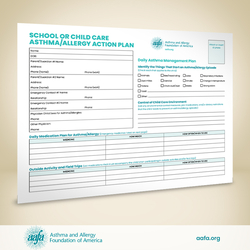Summer camps can help your child make friends, practice social skills, and build self-esteem and self-confidence. When your child has asthma or allergies, working with the staff and preparing in advance is key to helping your child focus on these skills while staying safe.
Here are some ways you can partner with camp staff to be prepared to manage your child’s asthma or allergies.
1. Think about the camp’s challenges and your child’s triggers.
Consider what type of camp your child will attend. They can range from day camp (half to full day) to overnight camp. Some last all summer, while others offer week-long sessions. Some staff members are local, while others travel from different states or countries.
Every camp is different. Think about the type of camp you will send your child to and how their asthma or allergy may be handled. Some camps are spread out over acres of property which might make them far from area hospitals. Rural camps could have limited or no cell phone coverage. Staff may plan field trips to other locations for a day or a week.
Is your child’s asthma triggered by heat, humidity, pollen, or poor air quality? Or do they have an allergy to latex or a biting or stinging insect? Think about how much time your child will spend outside. Talk with your child’s doctor about whether or not they need a change to their treatment plan to manage their asthma and allergies while at camp.
Smoke from barbecues, grills, bonfires, or fire pits can also trigger asthma. If the camp has a lot of outdoor activity, your child may be exposed to smoke during the camp.
Think about all of these factors while you’re preparing and working with camp staff to put together a plan for managing your child’s asthma or allergy.
2. Talk with camp staff about how they manage asthma and allergies.
Talk with camp staff to find out how they handle asthma and allergies before your child leaves for camp. Proper planning and staff training are critical. If possible, meet with the camp director and camp nurse.
When you talk to the camp staff, ask the following questions:
- What are the camp’s asthma and allergy policies?
- Will all staff follow the policies at all times in all settings?
- Are health care staff at the camp at all times?
- Are all staff trained regularly on managing asthma and allergies, treating symptoms, and giving emergency medicines?
- Will they make every effort to include your child in all activities?
- Where will medicines be kept? How will daily management medicines – such as asthma controller medicines and allergy medicines – be given? Will emergency medicines be protected from the heat when outside?
Are local summer camps and programs required to accommodate my child with asthma or allergies?
In many cases, the answer is yes! Under the Americans with Disabilities Act (ADA), public programs must accommodate your child’s asthma as long as it does not:
- Create an undue burden for the camp
- Fundamentally change the way the camp operates
3. Work with staff to create a plan to prevent and treat asthma symptoms and allergic reactions.
Your child should have an individual health care plan for camp. This will be similar to a school health care plan. It outlines what the camp will do to create and maintain a safe environment for your child.
This health care plan should also include an asthma or allergy action plan. This lists symptoms staff should look for and when and how they should treat asthma symptoms or an allergic reaction.
Work with your child’s allergist to fill out the Asthma and Allergy Foundation of America’s (AAFA) School or Child Care Asthma/Allergy Action Plan. Or the camp may already have health care plan forms for you to fill out. Give copies to the camp and ask to review them with the camp nurse before camp starts.
Talk with camp staff about where your child’s medicine will be kept during the camp. If your child has asthma, make sure your child’s quick-relief medicine (such as albuterol) will go with them wherever they go at all times.
If your child is going to an overnight camp, talk with staff about how asthma controller medicines will be given and monitored.
If your child is allergic to latex or biting or stinging insects, ask the staff how they deal with severe allergic reactions known as anaphylaxis. Let them know epinephrine should go with your child everywhere. Talk with the camp about ways to reduce your child’s exposure to insects or latex.
With a good partnership with the camp staff and some planning, your child can make great summer memories while managing their asthma or allergies.
Get answers about managing your child's asthma and allergies on our online forums.




Comments (0)